Relish in the Glow of a Vibrant Smile with Our Unique Dental Implant Solutions

Contemporary Dental Clinic - Unsurpassed Focus with an Emphasis on Patient's Ease, Blending Revolutionary Methodologies with Considerate Service
Explore our unwavering commitment to achieving peak dental well-being. Our state-of-the-art dental centre offers unmatched aid, custom-tailored treatments, and a welcoming environment. Our devoted dentists prioritise your comfort and satisfaction, cultivating strong, enduring relationships. Join us for an incredible dental adventure.

Unrivalled Dental Implants, Assuring to Revitalise Your Smile
We present value-oriented dental implant solutions in Perth, intricately fashioned to reliably fill the gaps left by missing teeth. Our highly recognised crew utilises superior-quality titanium implants to lay a robust foundation, meticulously integrating the screw with your jawbone.
Leveraging cutting-edge apparatus and methodologies, our proficient squad supervises the entire dental implant process. We offer a vast selection of dental implant alternatives for you to consider. After secure placement, a prosthetic tooth is affixed to the implant, perfectly filling the gap and mimicking natural teeth.
For trustworthy and swift dental implant services, count on our team of seasoned dentists.
SMILE GALLERY
Visualise the magnetic allure of your vibrant smile following the successful completion of your dental implant treatment.
Zygomatic Dental Implants

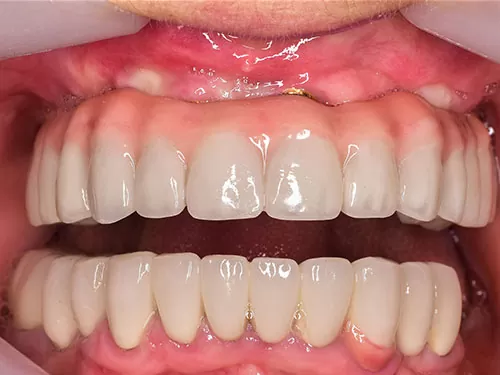
Procedure:
The patient’s treatment journey was initiated with a detailed evaluation, culminating in a unique design for a zygomatic dental implant procedure. This approach is ideal for patients with severe maxillary bone loss and who prefer to avoid bone grafting procedures.
Our proficient implant dentist carefully placed elongated implants into the patient’s zygomatic bone located in the cheek area. Following an adequate healing interval, the artificial tooth was securely affixed. This innovative solution offered the patient dependable mouth dental implants, enhancing their oral health considerably and bringing a new radiance to their smile.
Endosteal Dental Implants
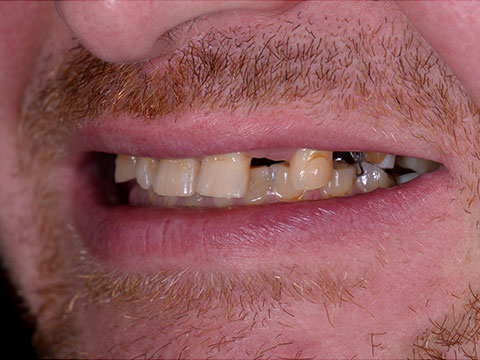
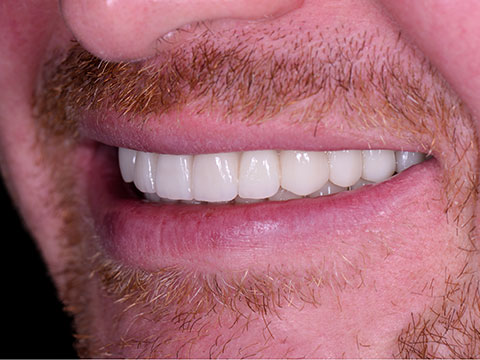
Procedure:
The patient’s treatment course began with a detailed examination, resulting in a unique plan for an endosteal dental implant procedure. This method is suitable for patients with a good quantity of healthy jawbones and who wish to avoid dentures or bridges.
Our proficient implant dentist expertly placed screw-shaped implants into the patient’s jawbone. After allowing a suitable recuperation time, the replacement tooth was connected to the implants. This traditional dental implant solution returned the patient’s ability to perform natural teeth functions, improved their overall oral health, and bestowed a brighter smile.
Transosteal Dental Implants
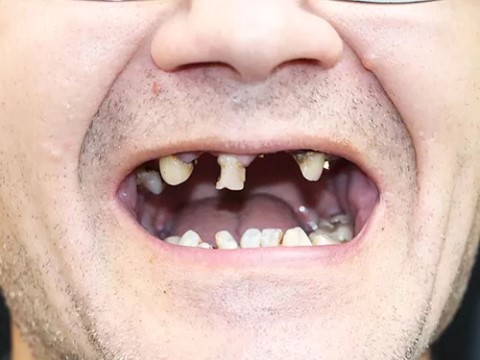
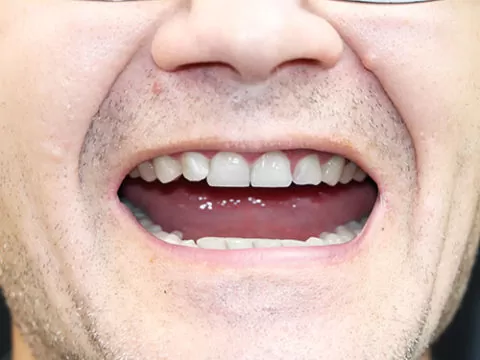
Procedure:
The patient’s therapeutic process was initiated with an in-depth review, leading to a customised plan for transosteal dental implant treatment. This approach is crafted for patients with significant bone loss in the lower jaw and who require a more secure solution than traditional dentures.
Our proficient implant dentist implemented a unique method that involved a metal support structure passing through the jawbone. After a sufficient healing phase, a prosthetic tooth was attached to this structure. This progressive technique provided the patient with sturdy dental implants, significantly augmenting their oral health and contributing to a radiant smile.
Note: Any surgical or invasive procedure carries risks. Before proceeding, you should seek a second opinion from an appropriately qualified health practitioner.
FAQs
How Should You Take Care of Your Dental Implants?
Dental implants, including single-tooth dental implants, represent a significant investment in oral health. They can restore functionality, aesthetics, and confidence. To enjoy the long-term benefits of these restorations, it is important to understand how to properly care for them. The following section offers insight into the different practices to keep your dental implants in the best possible condition.
Regular Oral Hygiene
The first step to maintaining your dental implants is practising regular oral hygiene. Just like natural teeth, dental implants should be brushed at least twice a day. A soft-bristled toothbrush is recommended to prevent damage to the surface of the implants. Regular brushing helps to eliminate plaque and bacteria that can cause gum disease and other complications.
Additionally, flossing once a day is equally essential. Flossing ensures that the areas between the implant and the neighbouring teeth are kept clean. If left unattended, these areas can become breeding grounds for harmful bacteria.
Specialised Dental Care Products
There are specialised dental care products available in the market that are designed specifically for dental implants. These include implant-specific toothbrushes and floss, as well as antimicrobial mouth rinses. These products can aid in effective cleaning without causing any harm to the implant surface.
Some kinds of toothpaste, particularly those that are abrasive, could scratch the surface of the dental implants and compromise their durability. Therefore, it is recommended to use a low-abrasive, tartar-control toothpaste.
Regular Dental Check-ups
Regular dental check-ups are an important aspect of dental implant care. Your dentist can monitor the condition of your dental implants and the surrounding gums and bone. Any potential issues can be detected early during these routine visits and addressed before they escalate.
During these visits, professional dental cleaning is also performed, which is crucial in maintaining oral health. Dentists have the tools and knowledge to clean areas that might be difficult to reach during your daily oral hygiene practices.
Healthy Lifestyle Habits
Certain lifestyle habits can affect the longevity of your dental implants. For instance, smoking can lead to gum disease, which is one of the leading causes of dental implant failure. Therefore, it is recommended to quit smoking to maintain the health and longevity of your dental implants.
A well-balanced diet is also important. Eating a variety of nutrient-rich foods can boost your overall oral health, ensuring that your gums and jawbone, which support the implants, stay healthy.
Protective Measures
To safeguard your dental implants from potential damage, wearing a mouthguard during contact sports and using a night guard for bruxism is essential. These protective measures help ensure the long-term success and longevity of your implants.
Also, avoiding hard foods that could potentially crack or damage the implant or the crown is advisable.
What Are the Factors Influencing the Cost of Dental Implants in Perth?
The cost of dental implants can vary considerably, depending on a wide range of factors. Dental implant costs are influenced by everything from the state of the patient’s oral health to the materials used and even the location of the dentist’s office. Here are some key factors that contribute to the overall cost of dental implants:
Initial Consultation
Often, the first step towards getting dental implants is a free dental implant consultation. During this meeting, the dentist assesses the patient’s overall oral health and determines whether dental implants are a suitable treatment option. While many dentists offer this initial consultation free of charge, some may include a fee. It’s important to check the cost of this consultation before making an appointment.
Pre-existing Oral Health Conditions
If a patient has pre-existing oral health issues like tooth decay or gum disease, these will need to be treated before the dental implant surgery can take place. The cost of these preliminary treatments will add to the overall dental implants cost.
Tooth decay may require fillings, root canal therapy, or even extraction. Gum disease can also range in severity from gingivitis, which can often be treated with professional cleaning and improved oral hygiene, to periodontitis, which may require a more involved treatment such as scaling and root planing or gum surgery.
The Number and Type of Implants Needed
The number of tooth implants a patient needs will significantly impact the cost. If a patient needs several implants, the cost will naturally increase. The type of dental implant chosen can also affect the cost. There are different kinds of dental implants, such as endosteal, subperiosteal, and zygomatic implants, and they vary in cost.
The Materials Used
The materials used in the dental implant also impact the cost. The implant itself is usually made of titanium, but the crown attached to the implant can be made from a variety of materials. Porcelain crowns, for instance, can cost more than those made from resin or other materials. The cost can also vary based on whether a patient chooses a removable or a fixed implant.
The Dentist’s Experience and Location
The cost of dental implants can also vary depending on the dentist’s experience and the geographic location of the practice. Dentists with more experience and advanced training might charge more for their services. Similarly, practices located in urban areas or cities with higher living costs might charge more for dental implants than those in rural areas or cities with lower living costs.
Additional Procedures
Additional procedures like bone grafting or sinus lifts can also add to the cost of dental implants. These procedures might be necessary if a patient has experienced bone loss in the jaw, a common result of prolonged tooth loss or gum disease. The need for these procedures can significantly increase the total dental implants cost.
While dental implants can represent a significant investment, they offer a durable and natural-looking solution to missing teeth. They can improve a patient’s quality of life by enhancing their appearance, boosting their confidence, and making it easier for them to eat and speak. Before deciding on dental implants, it is crucial for patients to understand the various factors influencing their cost and to discuss these with their dentist during their free dental implant consultation.
What Are the Different Types of Teeth Implants?
Endosteal Implants
These dental implants are typically made of titanium and are shaped like small screws. They are inserted directly into the jawbone, making them a suitable choice for most patients with good oral health and adequate jawbone density.
Subperiosteal Implants
Subperiosteal implants are primarily used for patients who do not have enough healthy natural jawbone and are unable to, or unwilling to, undergo a bone augmentation procedure to build more bone. Instead of being placed into the bone like endosteal implants, these implants rest on top of the jawbone but under the gum.
Zygomatic Implants
Zygomatic implants are the least common type and are used only if the patient has an insufficient bone in the upper jaw for either endosteal or subperiosteal implants and where traditional bone grafting procedures may not be ideal.
These implants are longer than regular ones and are placed into the cheekbone (zygomatic bone) rather than the upper jaw. This procedure is more complex and requires a high level of skill and expertise from the dentist.
Mini Dental Implants (MDIs)
Mini dental implants (MDIs), also known as narrow or small diameter implants, are narrower than most commonly used dental implants. They are often used in patients who have a narrow bone structure, those who require small teeth or incisor replacements, or for stabilising removable dentures.
The procedure for placing MDIs is less invasive and typically quicker, with the implants often ready for immediate loading of crowns or dentures.
Dental implants come in various forms, each designed to suit different patient needs and bone structures. The choice of implant type depends on a variety of factors, including the patient’s oral health, the quality and quantity of the jawbone, and the patient’s personal preference. A skilled dental professional can help determine the most suitable type of implant for each individual patient. Regardless of the type, dental implants provide a robust and enduring solution to tooth loss, often improving both function and confidence.
What Foods Can You Enjoy After Dental Implant Treatment?
Dental implant treatment, a substantial stride in one’s oral health journey, necessitates an adaptation of dietary habits in the days and weeks following the procedure. While it may seem daunting, the adjustment can still accommodate a variety of delicious and nutritious foods that not only ensure a smooth recovery but also boost overall well-being. This section explores an array of foods you can relish after your dental implant treatment.
Soft Fruits
Fruits are a decent source of essential vitamins and minerals, which are crucial for a swift recovery. Soft fruits such as bananas, peaches, and melons require minimal chewing and can be enjoyed without putting stress on your new implants. Applesauce and fruit purees can be an excellent way to incorporate more fibrous fruits into your diet without causing discomfort.
Cooked Vegetables
Although raw vegetables might be tough on your dental implants initially, cooked veggies are a great option. They are easier to chew and digest, and they also provide a wealth of vitamins and minerals. Try cooking carrots until they are tender, or enjoy some mashed sweet potatoes. Steamed broccoli and cauliflower, as well as peas and beans, are also good choices. You can puree them for a smoother texture.
Soft Proteins
Protein is a vital nutrient that helps with healing and tissue repair. Soft protein foods such as eggs, tofu, and fish can be easily incorporated into your post-implant diet. Cooked beans and lentils are also a valuable source of protein and are easy to chew. Chicken and turkey can be enjoyed if they are cooked until tender and cut into small, manageable pieces.
Dairy Products
Dairy products like milk, yoghurt, and cheese are high in calcium, which is beneficial for bone health – an important factor when recovering from dental implant surgery. Yoghurt also has the added benefit of being rich in probiotics, which can promote a healthy gut. Cheese can be enjoyed as long as it’s in a soft or melted form.
Soups and Broths
Soups and broths are ideal after dental implant surgery, as they require little to no chewing. They can also be packed with a variety of nutrients depending on the ingredients used. Bone broth is a particularly good option, as it’s rich in collagen, which can aid in the healing process. Vegetable soup pureed to a smooth consistency can also be a comforting and nutritious meal.
Smoothies and Shakes
Smoothies and protein shakes can be a quick and easy way to get a variety of nutrients in one go. You can make fruit smoothies using soft fruits and a liquid base like almond milk or yoghurt. Adding a scoop of protein powder can also help to boost your protein intake.
Cooked Grains
Cooked grains such as rice, oatmeal, and quinoa are easy to chew and are a good source of fibre and other essential nutrients. Make sure they are cooked until they are soft and easy to chew.
While your diet after dental implant surgery might be limited initially, there are still a lot of delicious and nourishing foods you can enjoy. As you heal, you’ll gradually be able to reintroduce more foods into your diet, eventually enjoying a full, varied, and satisfying menu.
LET US CREATE YOUR PERFECT SMILE
Fill out the form below, and we will contact you during our working hours.
